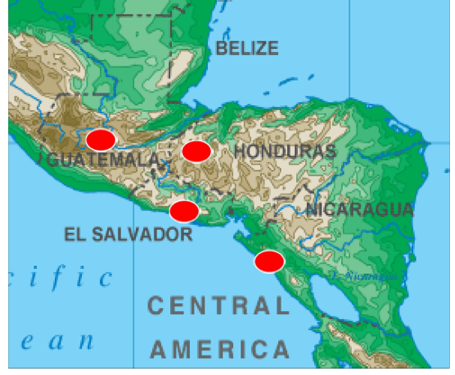Research Programs in Global Health: Cancer Control in Central America
The Central America Four (CA-4) LMIC Region
The Central America Four region (“CA-4”: Honduras, Nicaragua, El Salvador, Guatemala) is a core low middle income country (LMIC) region in Latin America and the western hemisphere. The CA-4 population is approximately 36 million, and directly linked to nearly 5 million U.S. immigrants. The CA-4 nations are interconnected by geography, history, language and poverty. In 2006, the CA-4 opened their borders, similar to the European Union, and has been in transition towards a union of many aspects of their infrastructures. This policy includes their health systems, with an appreciable flow of patients across borders.
The human development indices (HDI) in the CA-4 rank among the lowest in the western hemisphere, 0.606 versus 0.915 in the U.S. Available data suggests that multidimensional poverty approaches 20%. An important challenge for health programs, as well as NCD and cancer control initiatives, is that nearly half (48%) of the CA-4 population live in rural areas. Lastly, the mean health sector and public health expenditures are low, ranging from 6.5-8.6%, compared with those in Costa Rica (9.9%) and the U.S. (17.1%).
Notably, the CA-4 countries account for a large number of recent immigrant populations to the U.S., which makes the region unique among global LMICs from a U.S. perspective. A number approximately equivalent to one quarter of the population of El Salvador lives in the U.S., the majority of whom are foreign-born. From the U.S. viewpoint, the research and prevention initiatives in the CA-4 may be informative for the U.S. Hispanic population, particularly for those from the region (over 4.5 million).
Central America Four Region

Importance of CA-4 Nations and a Regional Approach
• Core LMIC region of the western hemisphere
• Region united by history, language, culture, and poverty
• Regional integration with open borders in 2006 (~EU)
• CA-4 population is >36 million
• Linked to nearly 5 million U.S. Hispanics
• At-risk population for Cancer & NCDs: >40 million
Vanderbilt research and teaching partners
• CA-4: COMISCA, INCAP
• Honduras: Ministry of Health (MOH), CAMO
• Nicaragua: UNAN-León, HEODRA, MINSA
• El Salvador: MINSAL, ASAPRECAN
• Guatemala: INCAP, INCAN, Wuqu’ Kawoq
Overview of Research Programs
Global Health and Gastric Cancer Epidemiology in Central and Latin America (2002-present)
Honduras gastric cancer molecular epidemiology and prevention initiative (2002-present)
- Focus: Population-based, gastric cancer epidemiology program
- Sites: Ministry of Health (MOH), Western Honduras (Copán) and Siguatepeque
Nicaragua global health and gastroenterology epidemiology programs (2003-present)
- Focus: Gastric cancer and gastrointestinal disease epidemiology
- Site: University of Nicaragua, León (UNAN-León)
El Salvador national gastric cancer program (2011-present)
- Focus: National gastric cancer epidemiology study and cancer control programs
- Site: Ministry of Health (MINSAL), San Salvador
University of Puerto Rico, Comprehensive Cancer Center (2014-present)
- Network linking gastric cancer epidemiology and chemoprevention research
Latin America H. pylori and Gastric Cancer Consortium (2006-2013)
- Focus: H. pylori eradication RCT and prevention initiatives
- Sites: Honduras, Nicaragua, Colombia, México, Costa Rica, Chile
Gastric Cancer chemoprevention Clinical Trials
Chemoprevention of gastric carcinogenesis in high risk populations (2014-present)
- Focus: Eflornithine (DFMO) in gastric intestinal metaplasia, Phase IIb RCT
- Sites: Honduras, Colombia
Gastric carcinogenesis prevention in high risk populations (2016-present)
- Focus: Curcumin in gastric premalignant lesions, Phase IIa RCT
- Sites: Puerto Rico, Honduras
Cancer Control and Cancer Registration initiatives in the Central America Four (2013-present)
LMIC programs and research in cancer informatics and registration (2013-present)
- CA-4 region: Honduras, El Salvador, Nicaragua, Guatemala
Technology and Endoscopy Research
- Ultra-low cost endoscopy technology for LMIC gastric cancer screening (2012-present)
- Novel technologies in endoscopy imaging for LMIC point-of-care testing (2016-present)
Click here for representative publications.
Overview of Research and Education Partners
- Hospital de Occidente, Ministry of Health, Santa Rosa de Copan, Honduras
- Central America Medical Outreach (CAMO)
- National Autonomous University of Nicaragua-León (UNAN-León)
- Hospital Escuela Oscar Danillo Rosales Arguello (HEODRA), León, Nicaragua
- El Salvador Ministry of Health (MINSAL)
- Salvadorian Association for Cancer Prevention (ASAPRECAN), El Salvador
- Institute of Nutrition of Central America and Panama (INCAP)
- Wuqu’ Kawoq Mayan Health Alliance
- Universidad del Valle (UdV), Guatemala
- Mani+
- Primeros Pasos
- Moore Pediatric Surgery Center
- Universidad del Valle, Cali, Colombia
- University of Puerto Rico, Comprehensive Cancer Center
Vanderbilt University Collaborators
- Division of Gastroenterology, Hepatology and Nutrition
- Center for Latin American Studies
- School of Medicine
- School of Nursing
- School of Engineering
Vanderbilt Opportunities for Student Engagement in the CA-4: